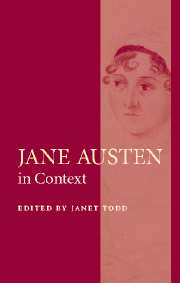22 - Education and Accomplishments
Published online by Cambridge University Press: 19 December 2020
Summary
As one critic declares, ‘All Jane Austen's novels, and many of her minor works, unfinished works and juvenilia, are about education.’ They are ‘about education’, however, in critical and complex ways. Education as usually understood today – schooling in certain skills, practices and bodies of knowledge – formed only part of education as Jane Austen and her contemporaries understood it: a process of socialisation and acculturation based on moral self-discipline and designed to fit the individual for a range of related roles in life, according to sex and rank. Furthermore, during the prolonged national and imperial crisis of Austen's day education became a field of ideological struggle in which the social groups who read Austen's novels – the upper middle class and the gentry – were deeply implicated. Austen's novels are ‘about education’ because they demonstrate the importance of female education to these social groups and particularly to their material interests in an age of revolutionary change.
Female education had caused increasing concern for over a century. The Lady's New-Year's Gift; or, Advice to a Daughter (1688) by George Savile, Marquess of Halifax, was reprinted into the late eighteenth century; François de la Mothe Fénelon's Traité de l’éducation des filles (1687) was reprinted several times in English, and enjoyed a revival in Austen's day. Both books prescribe education for moral self-control and social usefulness within family and class. Similar conduct or advice books proliferated after midcentury as female education was implicated in accelerating social change and the national and imperial destiny. The Scottish clergyman James Fordyce's Sermons to Young Women (1766), reprinted into the early nineteenth century, advised readers to cultivate femininity for moral reform and leadership in the national cause – Britain had just emerged from the Seven Years’ War with France. The English clergyman John Gregory urged a more resolutely middle-class programme in his frequently reprinted A Father's Legacy to His Daughters (1774), advising education for domesticity, moral self-discipline and fortitude in married life.
- Type
- Chapter
- Information
- Jane Austen in Context , pp. 252 - 261Publisher: Cambridge University PressPrint publication year: 2005
- 2
- Cited by



